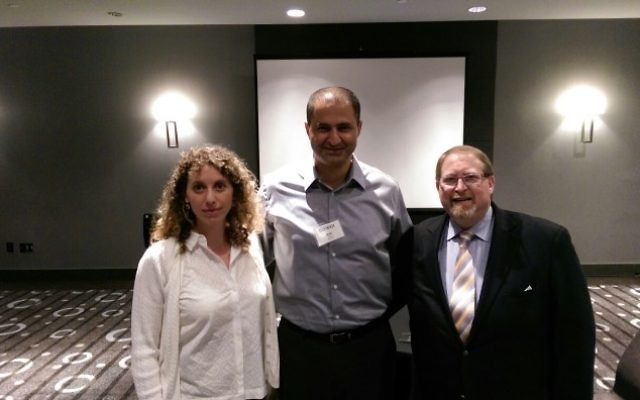Integrating Israeli Arabs Into Startup Nation
By David R. Cohen / david@atljewishtimes.com

Arab citizens make up 21 percent of Israelis but contribute just 8 percent to the GDP. The Arab minority has a poverty rate that is nearly three times that of the Jewish population. It’s estimated that the Israeli economy annually loses 31 billion shekels ($8.1 billion) as a result of not realizing the workforce potential of the 1.7 million Israeli Arabs.
In 2013, Israeli-founded technology company Amdocs, which has a large office in Alpharetta, opened a branch in Nazareth, Israel’s largest Arab city. Now Amdocs Nazareth is at the forefront of an Israeli revolution to bring Arab citizens into the high-tech fold.
Ihab Atalla, who heads Amdocs Nazareth, visited Atlanta on Thursday, July 23, to speak about his mission to integrate the Israeli high-tech sector. The event was organized by the Inter-Agency Task Force on Israeli Arab Issues and Conexx: America Israel Business Connector.
He sat down with the AJT after his presentation to talk about Amdocs’ groundbreaking workplace in Nazareth.
AJT: Can you tell me about your presentation today and how you came to be in Atlanta?
Atalla: First, I am vacationing [laughs]. I used to live in the States for about 10 years and moved back to Israel four years ago. It was important for me to come here and talk about the story of our office in Nazareth and also to expose people to the idea of having more Arabs working in the software arena.
AJT: Why is it so important to get Arabs involved in the tech sector?
Atalla: Because I do believe that it can help Israel as a state and improve the economy. I also believe in coexistence, and programs like this can definitely help. The model can work.
AJT: You have Muslims, Jews and Christians all working together at your Nazareth office. Was that something you were prepared for when the office opened?
Atalla: Diversity is an outcome; it’s something we found ourselves having. We found that good diversity is actually a strength. We wanted to have an office that would provide 24/7 support and operations support. To be open 24/7, you need to be open all days, including the weekend. On Saturday, which is very religious for Jewish people, Muslims or Christians can work. Sunday is a holy day for Christians, but Jews can work. Diversity is very important to us.
AJT: So what’s the biggest thing you want to get across to people here?
Atalla: OK, so two things. First, as a business you can see that the diversity is working. We have had very strong results. Second, the opportunities for Arab Israelis are now there, but they need to grow more outside of Amdocs.
AJT: What is the Israeli government doing to promote Arab inclusion in the workforce?
Atalla: There are a few programs out there right now. The president of Israel, Reuven Rivlin, is trying to bring more opportunities because he believes in it. It’s something that really everyone benefits from. The government is pleased with the example AMDOCS is setting since advanced employment for Arabs is a major goal for them. More activities and opportunities will definitely establish a stronger foundation. Now we can see that more Arabs are talking about careers, international experiences and learning all the languages. You can see that the engine is turned on already.




comments